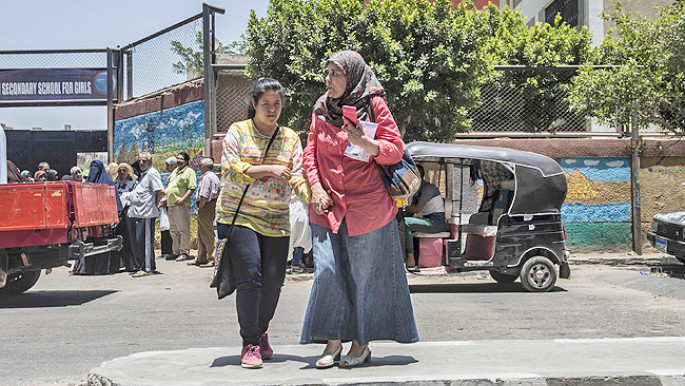Inclusion over isolation: Tackling mental disability stigma in Egypt
Winning the chance to sit standard high school tests took years of fighting in a country where people with mental disabilities are often marginalised and receive little assistance.
"I'm so proud. We've been fighting for 18 years for this moment. She sat the exam like any other high schooler," said Tosson.
"No matter the result, it's proof that it can happen."
She is visibly moved as her daughter comes out of the school, smiling and looking serene.
Out of Egypt's population of around 93 million, an estimated 14 million have some form of disability, said Eglal Chenouda, director of the SETI Center, a section of Catholic charity Caritas which supports the disabled.
Three-quarters of them have a mental disability, she said. The organisations helping them are few and far between.
 |
Out of Egypt's population of around 93 million, an estimated 14 million have some form of disability |  |
"Most of them are staying at home, deprived of any services," she said, adding that only two to three percent of them receive the services they need.
But activists are working to tackle public ignorance around mental disability and the stigma it carries – something they say is as important as providing services.
That is a core part of the mission of SETI, which stands for "Support, Education, Training for Inclusion".
Fighting stigma is a big part of the battle. Tosson said that when she was looking for nursery schools she had to contact at least 50 before she found one that would enrol her daughter.
 |
| Ghada Tosson [L] with her daughter Loujine [AFP] |
At SETI's toddler section, four-year-old Yassin does learning activities under the care of his mother Hoda Abdelkhalek and a Caritas trainer.
Focused, the young boy with Down's syndrome stacks coloured rings around a cone.
Abdelkhalek said the family found out about his disability the day he was born.
"It was very hard," she said. "(The doctor) told us 'your son is Mongolian'," a term used in many countries for people with the syndrome but which many consider derogatory.
Hospital staff advised her to isolate the baby in a separate room several times a day and limit his contact with his older brothers.
 |
Egypt has just 68 institutions able to provide care for the mentally disabled |  |
At SETI, she was taught the opposite. Staff urged her to integrate Yassin into the daily life of his family and the neighbourhood.
Chenouda said it is important to change public attitudes, convince people that disability is a rights issue and to "include the disability issue in all services".
But the services provided by organisations like SETI fall far short of the huge demand.
Egypt has just 68 institutions able to provide care for the mentally disabled, said Khaled Aly, who heads the rehabilitation department of the ministry of social solidarity.
"It's not enough compared to the number of mentally disabled people, but we're on the right track," he said.
Aly said a new bill set for a parliamentary vote next year will give the government more responsibilities and improve communication between the health and education ministries.
He adds that the ministry already organises workshops in villages in rural Upper Egypt to "inform and sensitise" people to issues of mental disability.
Other initiatives in the country have shown that integrating the disabled into Egyptian society is both possible and beneficial.
Olfat Salem has been organising cultural and sports activities for the mentally disabled at the Alexandria Sporting Club for 20 years.
"The families used to be ashamed; they would come at the club late at night, sit in a dark corner," she said.
Playing sport transformed the children, she adds.
"Receiving a medal gives them happiness you could not imagine. It gives them self-confidence. And now the families are proud of them as well."





 Follow the Middle East's top stories in English at The New Arab on Google News
Follow the Middle East's top stories in English at The New Arab on Google News


